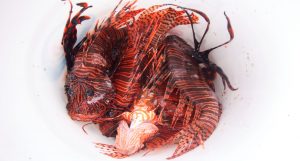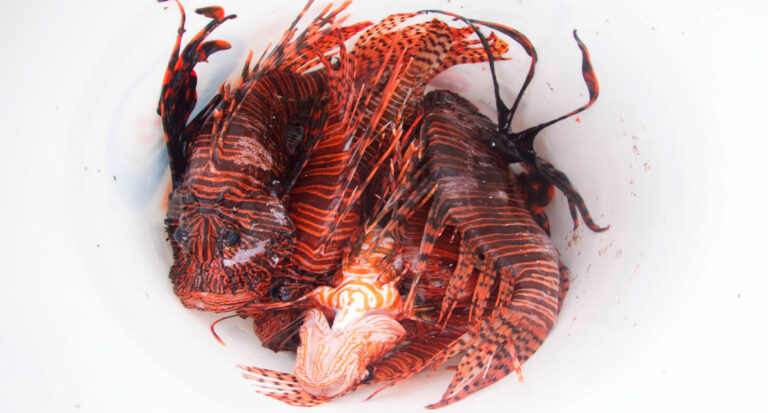At 11am on Tuesday, 2 July, the first box of filleted invasive lionfish left Belize international airport bound for Minneapolis, Minnesota.
 Its contents: 5.2 kg of the invasive lionfish, Pterois volitans, a species that poses one of the greatest threats to the sustainability of coral reefs and fisheries throughout the Caribbean region.
Its contents: 5.2 kg of the invasive lionfish, Pterois volitans, a species that poses one of the greatest threats to the sustainability of coral reefs and fisheries throughout the Caribbean region.
First released accidentally into the Caribbean near Florida by aquarists in the 1980s, the predatory fish from the Indo-Pacific has no natural predators in the Atlantic, and an exploding population is steadily eating its way across the entire Caribbean Sea. From the Bahamas to Barbados, coral reefs – and the traditional fisheries they support – are now under siege from this unforeseen threat.
(Above) A lionfish’s stomach contents, including a juvenile blue tang, a species protected from fishing on account of its ecological importance to Belize’s reefs: as a herbivore, it prevents corals from becoming smothered by algae. Picture © Blue Ventures
While complete eradication of this destructive fish is now impossible, consistent, high-volume removal efforts may halt population growth, diminishing the devastating threat the species poses to native fish populations.
On Belize’s World Heritage listed Barrier Reef Reserve System, efforts are now underway to do just that. Conservationists and communities are working together to confront the lion in its den, by cultivating a new international export market for this surprisingly delicious fish; a prospect that Blue Ventures has been exploring within the domestic and international spheres since 2012.
“This market-based approach to the lionfish challenge has the potential to be replicated across the entire Caribbean region”, says Jennifer Chapman, Belize Country Coordinator for Blue Ventures “It represents a scalable solution to the problems lionfish pose to both reefs and fisheries.”
The development of a market for lionfish has been heralded as the most feasible and practical fisheries management solution, providing much-needed systematic reduction of lionfish in Belizean waters, whilst diversifying fisheries and reducing the pressure on already overexploited native stocks.
Thanks to efforts by the Placencia Producers’ Cooperative Society Ltd and US sustainable seafood distributor, Traditional Fisheries, facilitated and supported by Blue Ventures, the Placencia Cooperative’s new processing facility was awarded US Food and Drug Administration (FDA) certification on June 26th 2013.
 “We’re very excited about taking the first shipment here out of Belize… Right now the majority of our clients are high-end restaurants in New York City, Las Vegas, Chicago and Houston.” said David Johnson, CEO of Traditional Fisheries, “We’d love to the local demand for lionfish grow and really make a difference in the Caribbean.”
“We’re very excited about taking the first shipment here out of Belize… Right now the majority of our clients are high-end restaurants in New York City, Las Vegas, Chicago and Houston.” said David Johnson, CEO of Traditional Fisheries, “We’d love to the local demand for lionfish grow and really make a difference in the Caribbean.”
Left to right:Justino Mendez, Operations Manager, Placencia Cooperative, Jennifer Chapman, Blue Ventures Belize Coordinator, David Johnson, CEO, Traditional Fisheries, in front of Belize’s first lionfish facility. Picture © Justino Mendez
With this certification the Placencia Cooperative facility becomes the first of its kind to process lionfish in Belize, and on its inaugural day in operation, 599 invasive lionfish were prepared both as fillets and whole fish, including the first shipment to the United States, to sell to the clients of Traditional Fisheries.
“Lionfish is not only a business for Placencia and [the cooperative’s] members”, said Justino Mendez of the Placencia Producers’ Cooperative Society Ltd, “it is the business of the entire country; from Sarteneja all the way to Punta Gorda.”
The cooperative’s new facility is now entering a quality-assurance period, during which time the export volume is forecast to grow substantially. Blue Ventures is continuing to provide safe-handling training to fishers and processing plant staff. Plans to expand the local market include convening several outreach, education and taster events throughout Belize in coming months.
Notes for editors:
Blue Ventures is an award-winning marine conservation organisation that works with local communities to conserve threatened marine and coastal environments, both protecting biodiversity and alleviating poverty. If you want to find out more about our work in Belize please contact Jennifer Chapman.
Placencia Producers’ Cooperative Society Limited (PPCSL), Belize, works to provide support for a sustainable and secure future for younger generations and local communities. Blue Ventures works with the PPCSL to establish and grow local and export markets for lionfish.
Traditional Fisheries is the only commercial supplier of lionfish in the world. They have been a key player in the development of Belizean export markets, providing advice, assistance and guidance at every stage of market development and facility preparation.








